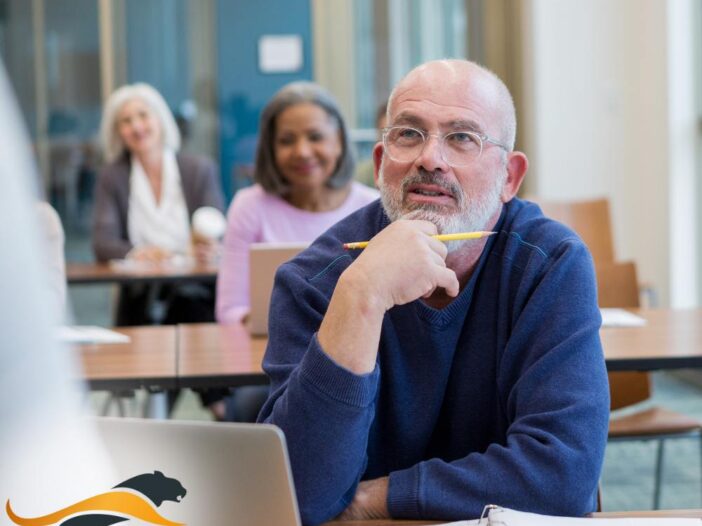
Numerous scientific studies have shown the importance in retirement of being both physically and mentally active. They also illustrate how being mentally active, agile and curious can have substantial brain health and cognitive benefits.
Goals for retirement
Many retirees set goals for improving existing skills in retirement, planning to take hobbies such as art and sports on to new levels of achievement with the additional time retirement affords.
Many also set a goal to learn a new skill, and according to research, that’s the better route. Learning a new skill is potentially more beneficial for maintaining your mental agility, retaining and even improving memory, and resisting cognitive decline.
The more the merrier
A study detailed in Scientific American showed that for older adults aged between 58 and 86 , learning three new skills in a three-month period was even more effective.
“Over the course of the intervention, people significantly improved their cognitive scores for memory and attention. In a follow-up study, we discovered that the participants had not only maintained their gains but had improved further: their cognitive abilities after one year were similar to those of adults 50 years younger.“
The problem is often, which skill do you want to learn? If you’re struggling to choose, we reckon there are three categories of skills based on both the skill itself and the ‘hidden’ benefits.
- Skills with a practical use
- Skills with a social aspect
- Skills with artistic outlets
Now obviously these overlap big time, but it might help you decide what to focus on first, or a skill in all three categories!
1. Skills with a practical use
One of our team was discussing retirement with a top-level exec who’d left the corporate rat race and expected to go down the part-time consultancy route. The problem was that he discovered that what he had done all his life didn’t really interest him, and that part-time was almost as stressful as full time!
New skills: Instead, he found himself intrigued by learning how almost everything in his home worked – and fixing what he could himself. His wife is delighted in that almost every ageing appliance now works like new. Our retiree isn’t daft; he doesn’t do what he’s not qualified to (gas appliances being the prime example), and he’s not great on ladders so height-based repairs are left to the professionals. However, his attitude is much more ‘can do’ and with no real time pressures, he can learn and then fix.
Hidden benefits: His repair and maintenance work also reduces the couple’s carbon emissions as they do not need to buy new machines through extending the life of their existing ones. Every manufactured item includes a substantial proportion of ‘embodied carbon’, i.e. the amount of CO2 emissions created by the appliance’s initial manufacture and delivery. Each ‘extra’ use of a repaired appliance further reduces the overall carbon footprint of the machine. The more you use a machine, the more of that initial carbon footprint is reduced by not replacing it. It’s basically paying off its carbon debt!
(For more on the carbon footprint of everyday activities, see the fascinating book “How Bad are Bananas: the carbon footprint of everything” by Mike Berners-Lee, creator of the Internet.
The other good news about learning practical skills is that they can benefit the whole family. Many retired parents use their skills to help their adult children not with childcare but with practical jobs such as gardening, running repairs, upcycling ( the 2020s phrase for “make do and mend!”), sewing and more. This also “works off” the carbon emissions impact of any manufactured item as above, whether water-guzzling denim jeans or previously “throw-away” small appliances.
2. Skills with a social aspect
One of the most popular social groups in my local area is the Mens’ Shed. It’s for retired people who want to learn or share new skills in a supportive environment – and access to a very well-equipped workshop. They get the benefits of regular company, sharing stories and concerns as well as skills. Our Mens’ Shed also create items needed by a whole range of local community groups and charities, from bird boxes to benches. For your nearest Shed see their website.
The same applies to those who volunteer for the various Repair Cafes in our area. People bring along broken stuff, and the volunteers either fix them or upcycle them. Again, there’s that social interaction, and like the TV version, a sharing of skills old and new. For more info, see Repair Cafe
Volunteering with almost any type of charity also provides that mix of new skills and company that provide purpose and meaning to retirement. Whether hands-on helping in a community centre, or getting thigh-deep in cold water for a conservation group, volunteering inevitably involves learning new skills, and often quite quickly! More info on becoming a conservation volunteer here.
Learning a new sport can add a social dimension too whether you are becoming part of a team, or joining a club of like-minded people. Often it’s as much about the chat as the game too. There’s a reason why the 19th hole in golf is so popular!
3. Skills with artistic outlets
All kinds of artistic skills can give us pleasure and help us relax, from painting and sculpture to playing music. According to research, one of the most effective skills to acquire to reduce cognitive decline is learning a new language. (We have put this into the artistic category as it has very similar benefits to learning a new musical instrument.)
In a study of people learning to speak Spanish for the first time, the cognitive benefits were maintained by regular and consistent practice rather than the level of proficiency. Learning a new language is also more of a “workout” for your brain than mind training puzzles.
As neuroscientist Dr Thomas Bak said in a BBC article, brain training puzzles such as Sudoku are like:
“Going to the gym and using one machine to repeat one movement. Learning a language … is like using 20 different machines which require lots of different movements. Language learning engages a number of different parts of the brain and boosts the connectivity between these different areas. In turn, this improved connectivity improves your higher mental function.”
If you’d like to learn a new language but feel a little daunted, the Rest Less website suggests six languages that are easier for native English speakers to pick up. How useful they are long term we’ll leave to you and where you want to take your next cruise or Scandinavian holiday!
- Norwegian
- Dutch
- Bahasa Indonesia
- Afrikaans
- Swedish
- Danish
Not sure how to plan your retirement goals?
Retirement doesn’t come with a manual, so you might find yourself struggling to work out the best retirement choices for you. Why not invest in my 1 to 1 coaching to help plan a fulfilling and rewarding retirement that balances on eight key pillars, including lifelong learning and volunteering.


